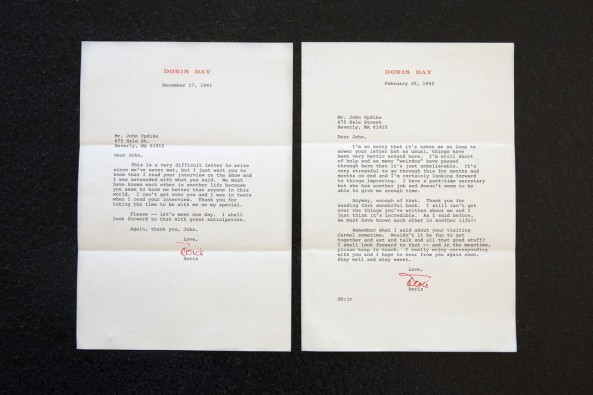This is a pair of John Updike’s old shoes he relinquished to the trash can. Famous or not, people do it all the time — produce trash, discard old stuff, haul piles of rubbish to garbage bins.
And this is Paul Moran, The Man Who Made Off With John Updike’s Trash and outlived the renown writer to tell about it.
One fine spring morning in 2006, he cycled down the street on which the famous writer dwelled. He saw an open garbage bin and thought he might find a copy of The New Yorker stickered with the writer’s name and address —something that would make for a quirky conversation piece. And so Moran decided to hop off his bicycle and walk over. He noticed that one of the garbage bags next to the bin had already been torn open—perhaps, he thought, by someone seeking aluminum cans or glass bottles, which can be returned for 5 cents apiece in Massachusetts. Spilling out of the bag, he saw smooth rectangles of red leather. Upon closer inspection, he realized Updike had thrown away a collection of honorary degrees from schools like Dartmouth College, Bates College, Emerson College, and Salem State College, all in pristine condition. What an amazing find!
Moran dove into the treasure trove of Updike’s trash multiple times…
As Updike himself once said in interview for Paris Review (1966), “My life is, in a sense, trash, my life is only that of which the residue is my writing.”
Some of Paul Moran’s finds:
John Updike often spoke of his admiration of actress Doris Day — the 1950s major Hollywood stars. In 1976, he wrote a review of her autobiography of the actress; his last book of poems included a poem Her Coy Lover Sings Out dedicated to Doris Day. The beginning of their correspondence was 1991, but it looks like they’ve never met either that year or later.
By his own admission, Paul Moran have never been a fan of John Updike. In his youth, he thought of Updike too dull and boring: all these stories about the middle class, of the petty bourgeoisie with their petty problems. But since he started collecting his refuse, he read some of his books and realized how really deep they are. Love affair and guff were merely a shell — the most trivial topics often lead to a deeper topics, such as the destiny of man, the struggle with the temptations of fate.
“No matter how hard I tried to spin it, I had the gnawing sense that what I was doing was wrong. I was committing one of the cardinal sins, coveting my neighbor’s trash.”
Nonetheless, temptation was hard to resist.

John Updike received Christmas cards from from both Republican and Democrat presidents and politicians.
- Letter opener from Cornell University, Updike mother’s Alma Mater.
- A magnifying glass that looks like a family heirloom.
- John Updike’s glasses — there are several pairs of them in Paul’s collection.
- Reel tape for an old typewriter — most likely kept in memory of his beginning as a writer.
- Notebook — there are a few of these in the collection
- Mickey Mouse Book, published in the 1930s.
- Cheap watch, perhaps having a sentimental value.
“I have received some justifiably harsh criticism for my actions and I am not asking for your approbation, gentle reader. But ask yourself this: What would you do if you had found Warhol’s etchings in the trash? Or Picasso’s? Would you be inclined to respect the wishes of a temperamental artist and let these items go off to the landfill? What about Da Vinci’s trash? Does the passage of time remove the taint of an object’s lowly origin? I knew that, eventually, prestigious institutions would clamor for his things regardless of their icky provenance.” (From Finding John Updike AND TAKING HIS TRASH by Paul Moran, in Texas Monthly, November 22, 2014)
More on the subject in Boston Globe: John Updike’s trash is everyone’s treasure, Andrew Sullivan’s The Dish: Dumpster Diving For Posterity, New York Times: Texas Man Treasures Finds in Updike’s Trash.







